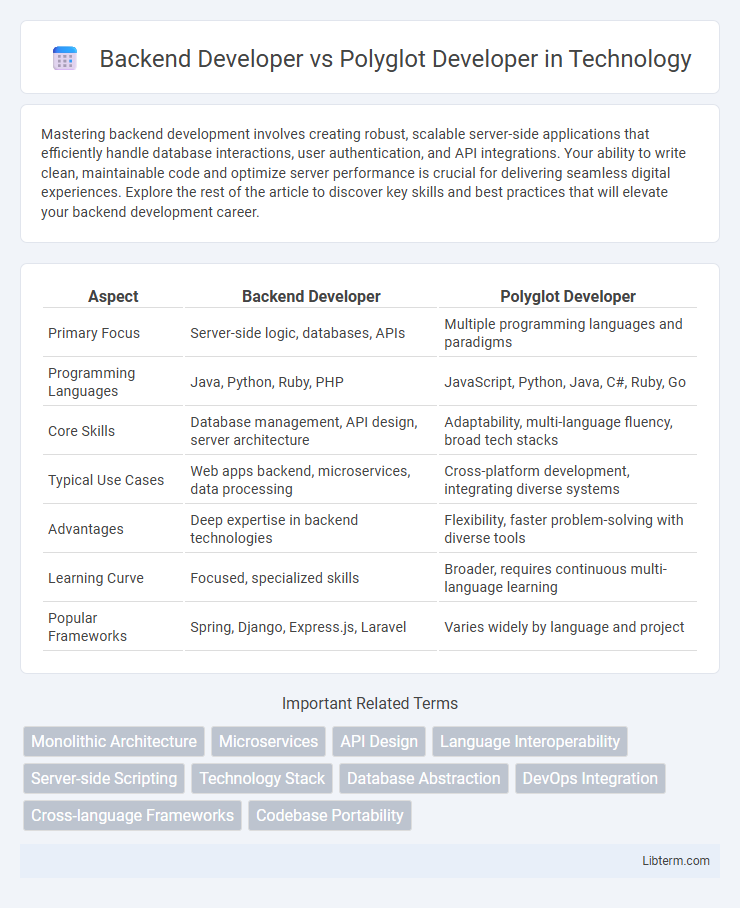Mastering backend development involves creating robust, scalable server-side applications that efficiently handle database interactions, user authentication, and API integrations. Your ability to write clean, maintainable code and optimize server performance is crucial for delivering seamless digital experiences. Explore the rest of the article to discover key skills and best practices that will elevate your backend development career.
Table of Comparison
| Aspect | Backend Developer | Polyglot Developer |
|---|---|---|
| Primary Focus | Server-side logic, databases, APIs | Multiple programming languages and paradigms |
| Programming Languages | Java, Python, Ruby, PHP | JavaScript, Python, Java, C#, Ruby, Go |
| Core Skills | Database management, API design, server architecture | Adaptability, multi-language fluency, broad tech stacks |
| Typical Use Cases | Web apps backend, microservices, data processing | Cross-platform development, integrating diverse systems |
| Advantages | Deep expertise in backend technologies | Flexibility, faster problem-solving with diverse tools |
| Learning Curve | Focused, specialized skills | Broader, requires continuous multi-language learning |
| Popular Frameworks | Spring, Django, Express.js, Laravel | Varies widely by language and project |
Introduction: Backend Developer vs Polyglot Developer
Backend developers specialize in server-side programming, managing databases, APIs, and application logic primarily using languages like Java, Python, or Ruby. Polyglot developers possess expertise in multiple programming languages and frameworks, enabling them to adapt quickly across various tech stacks and project requirements. This versatility allows polyglot developers to handle diverse development tasks beyond backend systems, including frontend and full-stack solutions.
Defining Backend Development
Backend development involves creating server-side logic, database management, and API integration to ensure seamless communication between the frontend and data storage. It requires expertise in languages like Java, Python, or Node.js, and frameworks such as Express, Spring, or Django to build scalable and secure applications. Polyglot developers extend this skill set by mastering multiple programming languages and paradigms, enabling them to choose the best tools for diverse backend tasks and optimize system performance across varied environments.
What Is a Polyglot Developer?
A Polyglot Developer is a software engineer proficient in multiple programming languages and technologies, enabling them to select the best tools for different project requirements. Unlike a Backend Developer who specializes mainly in server-side development using specific languages like Java, Python, or Node.js, a Polyglot Developer adapts to frontend, backend, mobile, or cloud environments by leveraging diverse coding skills. This versatility enhances problem-solving capabilities and accelerates innovation across various software development domains.
Core Skills of Backend Developers
Backend developers specialize in server-side programming, database management, API integration, and cloud infrastructure, ensuring efficient data processing and system scalability. Core skills include proficiency in languages like Java, Python, Ruby, and frameworks such as Node.js and Django, combined with expertise in SQL and NoSQL databases. Polyglot developers, while versatile across multiple programming languages and paradigms, may lack the deep specialization in backend technologies crucial for optimizing server performance and security.
Advantages of Being a Polyglot Developer
Polyglot developers possess the advantage of versatility by mastering multiple programming languages, enabling them to select the most efficient technology stack for diverse projects. Their broad skill set enhances problem-solving capabilities, as they can apply varied programming paradigms and optimize code performance across different platforms. This adaptability not only accelerates development cycles but also increases their value in dynamic team environments where cross-disciplinary expertise is essential.
Technology Stacks: Specialization vs Versatility
Backend developers specialize in server-side technologies such as Node.js, Python (Django, Flask), Ruby on Rails, or Java (Spring), optimizing performance, security, and database management within a specific stack. Polyglot developers excel in multiple programming languages and frameworks, enabling them to switch between JavaScript, Python, Go, Rust, or others, adapting to diverse project requirements and integrating various technologies. This versatility allows polyglot developers to handle full-stack challenges, while backend developers maintain deep expertise in particular ecosystems for robust, scalable application development.
Learning Curve and Career Growth
Backend Developers typically focus on mastering server-side technologies like databases, APIs, and server scripting, resulting in a more structured learning curve concentrated on specific languages such as Java, Python, or Ruby. Polyglot Developers need to adapt to multiple programming languages and paradigms, leading to a steeper initial learning curve but broader technical versatility. Career growth for Backend Developers often follows a trajectory within specialized roles like DevOps or system architecture, whereas Polyglot Developers benefit from diverse opportunities across various domains and can pivot more easily between technology stacks.
Industry Demand and Job Opportunities
Backend developers remain in high demand due to the critical need for robust server-side applications in industries such as finance, e-commerce, and healthcare, with strong job opportunities in enterprises seeking expertise in languages like Java, Python, and Node.js. Polyglot developers, skilled in multiple programming languages and frameworks, attract employers aiming for versatile teams capable of handling diverse projects across cloud computing, microservices, and AI development. The industry increasingly favors polyglot developers for innovation-driven roles, while backend developers continue to fill essential positions focused on scalability and security in large-scale backend systems.
Salary Comparison: Backend vs Polyglot Developers
Backend developers typically earn a salary range between $70,000 and $120,000 annually, reflecting their specialization in server-side technologies such as Node.js, Python, and Java. Polyglot developers, proficient in multiple programming languages including JavaScript, Python, Ruby, and Go, often command higher salaries ranging from $85,000 to $140,000 due to their versatility and ability to adapt to diverse project requirements. Salary differences are influenced by factors like experience, location, and industry demand, with polyglot developers valued for their broad skill set in dynamic development environments.
Choosing the Right Path for Your Career
Choosing between a Backend Developer and a Polyglot Developer hinges on your career goals and technological preferences. Backend Developers specialize in server-side logic, databases, and API integration, mastering languages like Python, Java, or Ruby to build robust, scalable applications. In contrast, Polyglot Developers leverage multiple programming languages across different platforms, enhancing versatility and adaptability in diverse project environments and demanding roles.
Backend Developer Infographic

 libterm.com
libterm.com